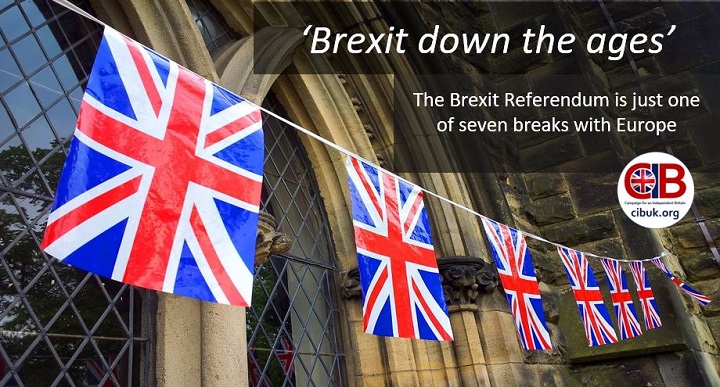‘Brexit down the ages’

Contrary to popular belief, the Brexit Referendum is just one of seven breaks with Europe which have taken place in these islands’ history over the past two millennia. We are indebted to Toquil Dick-Erikson, author and legal journalist for his potted history of Brexit down the ages.
From the Roman occupation to the present day, he identifies seven clear breaks with the continent over who should rule us and how. And today, with Reform UK MPs now duly elected to parliament he sees it their duty to campaign for the United Kingdom to complete the process of leaving the European Union with particular reference to the European Court of Human Rights (ECHR) and the European Arrest Warrant (EAW), which still tie us to the EU’s apron strings.
What follows is a summary history of our relations with Europe and a link to the full article beneath it.
The 7th Brexit in History
By Toquil Dick-Erikson
How Many More Times?
On 23rd June 2016 (St George’s Day) the people of Britain voted to leave the European Union. This was an historic moment. We could say this was the 7th Brexit in history. And it is not complete yet, as we shall see.
The first Brexit
In 43 AD our island was invaded by Rome, and united to the rest of Europe, being absorbed into the Roman Empire as a province. There was staunch resistance, as by Boadicea queen of the Iceni, who is celebrated in a statue opposite Big Ben, but it was overcome by ferocious Roman military might. The subordination of Britain to Rome lasted for around three and a half centuries.
The first Brexit was in 410 AD when the Roman legions left, and that was the last time, up until 1973, that the country was governed from a location beyond our shores – Rome.
For one and a half thousand years ever since then, this country was always governed from a location within the country itself. Even William the Conqueror left Rouen his capital in Normandy and established his seat of government in England in London.
In the Middle Ages, England was a Roman Catholic country, under the spiritual supremacy of the Church of Rome. But in the early thirteenth century, the Pope was setting up a fearsome machinery of tyranny, the Holy Inquisition, in order to stamp out opposition – heresy, witchcraft and science.
The second Brexit
So, in 1215, we had the second Brexit, when England defied the Pope’s wrath and forced the King to accept Magna Carta. This limited his powers to punish his subjects at will. The rest of Europe however was made to accept the Inquisition.
The paths of development of our system of criminal justice and that of the Europeans diverged then and have never come together again since.
The third Brexit
Henry VIII effected the third Brexit in 1534. He had broken with the Church of Rome, established the independent Church of England with himself as its head, and he passed the Act of Supremacy, under which
“no foreign prince, person, prelate, state, or potentate hath, or ought to have, any jurisdiction, power, superiority, pre-eminence, or authority, … within the realm” .
After Henry’s death there was an attempt to restore the authority of Rome by his Catholic daughter “bloody” Mary. This was rejected by her sister Queen Elisabeth I, who in 1558 reaffirmed the Act of Supremacy and in 1588 fought off the attempt by the Spanish Armada to bring the country back into subjection to a foreign authority. And it was under the first Elisabeth that the country turned its attention away from Europe to the wide open seas, founding colonies in the New World, with Sir Walter Raleigh in Virginia, and Sir Francis Drake circumnavigating the globe.
.
The fourth Brexit
I would consider 1649 to mark the fourth Brexit, when our form of government became notably different from that of the rest of Europe. At that time nearly all European countries were governed by autocratic monarchs – we remember King Louis XIV of France who said, notoriously, “I am the State”.
In Britain, in marked contrast, Parliament arose and asserted its authority over the king, with a civil war which ended by cutting off the King’s head; but then 12 years later Parliament itself restored the monarchy with a settled constitution with checks and balances.
The fifth Brexit
At the end of the eighteenth century Europe was thrown into turmoil by the French Revolution, which overthrew the absolute monarchy of France, cutting off their king’s head and thousands of others in the process. However the helm of their ship of State was swiftly seized by Napoleon Bonaparte, who imposed, not a reasonable, balanced form of government as had developed in England, but his own autocracy, and whose armies spread it to many other countries in Europe.
He aimed to include Britain in his empire too, but was defeated, first at Trafalgar by Nelson, and then definitively by Wellington at Waterloo in 1815. So, 1815 marked our fifth Brexit, or break with a plan to unite all Europe under one rule.
The sixth Brexit
Britannia became now the chief industrial power in the world, and Britannia’s navy ruled the waves, and thus grew up the British Empire in five continents. Notions of freedom and fairness were still amongst the guiding values of the British people, and so in the fulness of time Britain voluntarily granted independence to its former colonies, avoiding the bloody wars of independence fought by France and Portugal and Spain and others in attempting to hold on to their own colonies.
The last struggle between Britain and Europe, where a continental power tried to conquer and subjugate the people of Britain, was the Second World War. Here again we fought them off victoriously, and so 1945 our sixth Brexit.
The seventh Brexit
And now we come to our own lifetimes. In 1973, under Heath’s government, instead of conquest by force of arms, it was, in Shakespeare’s prophetic words,
” With inky blots and rotten parchment bonds:
That England, that was wont to conquer others,
Hath made a shameful conquest of itself. “
And the people were deceived and tricked by their own governments into accepting subjugation to a foreign yoke, when the primacy of European Community law was established over UK law, in the Treaty of Rome.
Yet once again, on 23rd June 2016 we effected our seventh Brexit. This time, it cost some toil, sweat and tears but luckily – so far! – it has been without bloodshed.
Of course, the fight is not yet over, we are still “lions being led by donkeys”. On Saturday 17th February 2018, 80 years after the appeasement of Hitler in Munich, a British Prime Minister went again to Munich to offer her “unconditional commitment” to sign a “Security Treaty” with the EU to keep us under the European Arrest Warrant and as members of Europol, i.e. under the sinew of the nascent United States of Europe.
We may yet see lethally armed paramilitary European Gendarmes (see www.eurogendfor.org) marching down our High Streets, ramming alien laws down our throats. At that point blood will doubtless be shed.
The 7th Brexit is by no means completed, despite the referendum result of now eight years ago.
It may be thought that the European Convention and Court of Human Rights (ECHR), to which all EU member states must subscribe, should provide protection and a remedy against this obvious violation of the citizen’s most fundamental human right without which all other rights are at risk – the right not to be arbitrarily deprived of one’s liberty. However, the Convention only says (art. 6) that a person has a right to a public hearing before an impartial tribunal within a “reasonable” time after arrest.
So, to complete the 7th Brexit, Britain must break free from the European Arrest Warrant (EAW). Parliament must amend the Extradition Act 2003 to eliminate the list of “Category 1” countries – they just happen to be the EU member States… – which alone are exempted from having to provide any evidence of wrongdoing when demanding the extradition of anyone from British soil.
In yesterday’s General Election, only one Party proposed completing Brexit by exiting the ECHR and the EAW. This was the Reform-UK Party, heir to the Brexit Party which campaigned for, promoted, obtained and won, the referendum of 2016. This Party won just four seats, with 4 million votes, that is 1 million votes for each seat. In contrast, the vagaries of our electoral system ensured that the Labour Party, which won over 100 times as many seats and an absolute majority in Parliament, needed only 23 thousand votes for each seat.
With a voice in Parliament, Reform-UK should now be able to spread its message farther and wider than ever before. The Tory Party is in serious disarray, and a vacuum is being created in the centre-right of the UK’s political spectrum, which Reform-UK could fill.
Let us hope that a way is found to make Parliament take these final steps, so that we may become a free and independent people once again.
We are grateful to the Bruges Group for their permission to republish this article. The full version can be found by clicking on the link here.
Main image: Montage © CIBUK.Org 2024





